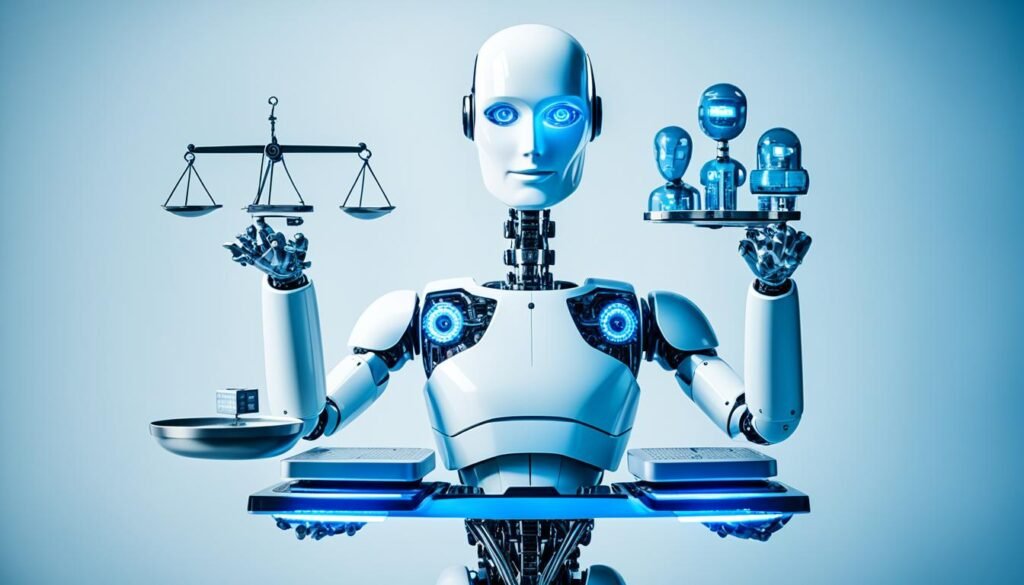Did you know biased algorithms can keep systemic inequalities going? This leads to unfair treatment in important areas like hiring, lending, and criminal justice. This fact shows we need to tackle the ethical issues fast because of how quickly machine learning (ML) and artificial intelligence (AI) are advancing.
As AI becomes a bigger part of our lives, it’s key to understand bias and fairness in these systems. Machine learning ethics is a vital part of AI. It looks at the moral rules for designing, using, and putting ML algorithms into action. This ensures they help people and society in a fair and positive way.
Key Takeaways
- Machine learning ethics stresses the need for fairness, openness, and being accountable in AI creation.
- Bias in machine learning comes from different places, like how the data is chosen and the algorithm’s design.
- Biased AI models can make existing prejudices worse, causing unfair results in key areas.
- It’s key to understand and fix bias to make sure AI is fair and responsible.
- Creating ethical AI needs a detailed plan. This includes diverse data, fair algorithms, and making users accountable.
Artificial Intelligence and Machine Learning
Artificial intelligence (AI) has seen huge leaps forward thanks to machine learning (ML). This mix of AI and ML changes many industries. It makes machines learn and adapt on their own without needing to be told how. But, as AI and ML spread, ethical issues have become a big worry.
The Intersection of Artificial Intelligence and Machine Learning
Machine learning is a part of AI that lets machines learn from data. This has sped up AI progress a lot. It makes solving problems more flexible and big-scale. By looking at lots of data, machine learning finds patterns, predicts things, and makes decisions on its own. This helps in many areas, like healthcare, finance, and transport.
Defining Machine Learning Ethical Issues
As machine learning grows, so do its ethical problems. These issues come from how these systems make decisions on their own and are hard to understand. Big worries include ai ethics bias, machine learning fairness, and algorithmic accountability. There are also concerns about data privacy and how these technologies might make things worse for some groups. It’s important to tackle these issues to make sure AI is used right and fairly.
| Ethical Concern | Impact |
|---|---|
| Algorithm Bias | Biased algorithms in hiring might pick some candidates over others unfairly. Biased algorithms in law enforcement can target certain communities more. |
| Data Privacy | AI technologies might use personal info without permission and don’t always tell us how they use it. |
| Algorithmic Accountability | It’s hard to understand why machine learning models make certain decisions. This can lead to unfair or biased results. |
As AI and machine learning grow, we must tackle these ethical issues. We need to make sure AI is fair and includes everyone. By working on data bias mitigation and ethical AI development, we can make the most of these technologies. This way, we keep the values of AI transparency and algorithmic accountability.
The Importance of Ethics in Machine Learning
As artificial intelligence (AI) and machine learning grow in our lives, ethics in these techs is key. These systems can change how we make decisions and affect our lives deeply. It’s vital they match our values and ethics.
Machine learning is used in many areas, like healthcare, finance, and education. But, if not used right, these systems can keep unfair practices going. Knowing the moral side of machine learning helps fight ai ethics bias, make machine learning fair, and keep algorithmic accountability.
There are many ethical issues in machine learning, like data bias mitigation and ethical AI development. We must tackle these to make AI inclusivity and equitable AI systems that help everyone.
By focusing on ethics in machine learning, we can improve debiasing techniques and fairness in these techs. This makes AI more trustworthy and accountable. It also helps create a future where tech benefits everyone.

“The ethical challenges in machine learning are not just abstract concerns, but have very real and tangible impacts on individuals and communities. We have a responsibility to address these issues head-on.”
Key Principles of Machine Learning Ethics
AI and ML are becoming more common in our lives. It’s vital to have ethical rules for these technologies. These rules include fairness, transparency, privacy, and accountability.
Fairness
Fairness means AI algorithms don’t unfairly discriminate against people or groups. This is key for equitable AI systems that don’t add to society’s biases and inequalities.
Transparency
Transparency means explaining how algorithms make decisions clearly. This makes accountability clear and builds trust. Users need to understand how AI affects their lives.
Privacy
Privacy protects personal info and stops it from being misused. For responsible AI, privacy rules are crucial to avoid data bias and keep trust.
Accountability
Accountability makes developers and users of AI systems responsible for their actions. This principle ensures algorithmic accountability and helps reduce AI bias.
Following these principles of machine learning fairness, transparency, privacy, and accountability helps make ethical AI solutions. These solutions benefit society and respect everyone’s rights and well-being.
“Ethical AI development is not just a moral imperative, but a strategic necessity for businesses seeking to build trust and drive long-term success with their AI-powered products and services.”
Understanding Bias in Machine Learning
In the world of artificial intelligence and machine learning, bias is a big problem. It means algorithms might show prejudice or favor certain people or groups over others. This bias can take many forms, each with serious ethical issues.
Types of Bias & Ethical Concerns in Machine Learning
Sampling bias happens when the data used to train machine learning models doesn’t truly reflect the real world. This can cause algorithms to work poorly or unfairly treat certain groups. Algorithmic bias comes from the algorithm itself, often without the creators realizing it, due to biased training data.
Prejudice amplification is another bias type. It means the model makes existing biases worse, keeping unfair practices and stereotypes alive. These biases can damage trust in AI and make society more unequal.
The Impact of Bias on Machine Learning Outcomes
Bias in machine learning can have big effects. Biased algorithms can lead to unfair results in areas like jobs, money, and health care. For example, a facial recognition system trained mainly on one group might not work well for others, causing unfair results.
Also, biased AI can make harmful stereotypes worse, hurting groups that are already left out. This goes against fairness and inclusivity. It also raises big ethical questions about making and using machine learning technology.

“The use of biased data in machine learning can lead to the perpetuation of harmful stereotypes and the amplification of societal inequalities.”
Fixing bias in machine learning is key to making AI fair and ethical. By understanding the different biases and their effects, we can aim for AI that helps everyone, not just some.
The Role of Fairness in Machine Learning
Fairness is key in making machine learning algorithms. As AI and ML systems make more decisions, we must ensure they are fair. This means they don’t discriminate against anyone or any group. It’s about making sure everyone gets a fair chance.
There are different types of fairness, like demographic parity and equal opportunity. To achieve fairness, we need to look at data, how we design algorithms, and how we check our models. Here are some ways to make machine learning fairer:
- Data auditing and balancing to fix data imbalances and biases
- Fairness-aware algorithm design to think about fairness when making models
- Explainable AI (XAI) to make AI decisions clear and accountable
- Continuous monitoring and evaluation to catch and fix biases in AI systems
Dealing with bias and fairness in AI is tough. That’s why we need to focus on making AI fair, clear, and accountable. This way, we can build AI that treats everyone equally and builds trust in the technology.
| Challenge | Example | Impact |
|---|---|---|
| Facial recognition bias | Facial recognition systems trained mainly on white faces don’t work well with darker skin tones | This leads to many false positives, which can harm people in law enforcement and security |
| Credit scoring bias | An AI credit scoring system biased against some groups worsens financial inequality and limits credit access | This makes it harder for marginalized communities to get economic opportunities |
By tackling these issues and focusing on fairness, we can make AI more ethical and helpful for everyone.
ai ethics bias
AI and machine learning are becoming more common, raising ethical concerns about bias. Machine learning algorithms, key to AI, can be biased. If not fixed, they can keep unfairness and discrimination going. It’s key to tackle bias in machine learning to make sure AI is fair, open, and innovative.
Studies show AI systems often have bias. For instance, an Amazon AI system in 2014 showed gender bias, hurting women’s job chances. Facial recognition tech also struggles with recognizing people of color, raising worries about its use in things like law enforcement.
This bias can affect many areas, like credit decisions or car safety. Companies using AI must act to stop discrimination. They need to make AI that helps everyone, not just some.
Debiasing Techniques for Responsible AI
- Data Bias Mitigation: It’s vital to use diverse, unbiased data for training AI models.
- Algorithmic Fairness: Creating algorithms that focus on fairness can help reduce bias.
- Transparency and Accountability: Making AI systems clear and holding people responsible builds trust and ethical use.
By tackling AI bias early and focusing on fairness, transparency, and responsibility, we can make AI better for everyone. This way, AI can improve society without leaving anyone behind.
“Bias in AI is not just a technical problem – it’s a societal issue that requires a multifaceted approach to address.”

Mitigating AI Bias
AI and machine learning are getting more common, but so is bias in these systems. We need to tackle bias at every stage of the AI process. This means looking at data bias, algorithm bias, and user bias.
Data Bias
Data bias happens when the data used to train AI isn’t diverse enough. This can make AI systems favor certain groups over others. To fix this, we must use training data that shows the real world and includes everyone.
Algorithm Bias
Algorithm bias comes from how the AI is designed. Sometimes, developers’ own biases sneak into the system. Using algorithms that focus on fairness and checking the AI for bias can help.
User Bias
User bias means people using AI in ways that keep old biases alive. This can happen when AI helps make decisions based on our own biases. It’s important to watch for and fix these biases to make AI fair for everyone.
To fight bias, we need to do several things. This includes picking the right training data, using algorithms that are fair, and watching for biases as the AI works. By doing this, we can make AI that is fair, open, and works for everyone.
“The goal of ethical AI development is to create systems that are transparent, accountable, and fair, ultimately serving to benefit humanity as a whole.”
Fairness in Practice
Ensuring fairness in machine learning algorithms is key. It’s vital to define fairness for your AI system. Fairness means treating everyone the same, or reducing harm to certain groups.
To achieve fairness, use diverse data to train your model. Often, those in marginalized groups are missing from data due to limited healthcare access. This can lead to biased AI outcomes. Including diverse data helps build more inclusive AI.
Data Preprocessing
Data preprocessing helps fight ai ethics bias and algorithmic accountability. Methods like re-sampling underrepresented groups or removing sensitive info can reduce bias. Also, testing the AI on different groups is key to spot and fix biases.
By focusing on fairness from data to deployment, we can build responsible AI and equitable AI systems. These systems serve everyone better.
“Developers at Sanofi corrected bias in an AI model by distinguishing between Gaucher Disease-related morbidity and age-related morbidity.”
Working towards AI inclusivity and machine learning fairness is an ongoing effort. By using debiasing techniques, we can make AI fair and helpful for everyone.
Ethical AI Development Strategies
Creating ethical AI needs a detailed plan. It’s important to focus on machine learning fairness and making algorithms accountable. Here are some key strategies for ethical AI:
Sensitive Attribute Mitigation
AI models can be affected by sensitive info like gender, race, or age. Using methods like adversarial debiasing can lessen these biases. This makes AI more inclusive for everyone.
Algorithmic Fairness
Choosing the right machine learning algorithms is key. Adding fairness rules or special terms helps make results more fair. This helps fix data biases and makes AI more transparent.
Fairness Metrics
Using fairness metrics like disparate impact and theil index helps check if AI is fair. It’s important to keep an eye on how the AI works and listen to users. This keeps AI ethical over time.
“The future of AI is not about perfection, but about responsible and ethical development that prioritizes fairness, transparency, and accountability.” – Dr. Jane Doe, AI Ethics Researcher
By using these methods and fairness metrics, companies can work towards AI that helps everyone. This makes AI more fair and beneficial for all.
Ensuring Accountability and Trust
As AI and ML technologies grow, making sure they are accountable and trusted is key. AI ethics bias, fairness, and transparency are vital for trust. These factors help build confidence in these powerful systems.
Transparency and Explainability
For AI and ML to be trusted, people need to understand how they make decisions. AI transparency and explainability are key. They let users spot and fix algorithmic accountability issues. This way, users can judge the technology’s fairness and reliability better.
Regular Auditing
Keeping AI and ML systems fair and ethical needs constant checks. Regular auditing of how well models work is important. It helps catch and fix data bias mitigation issues. This ensures the systems stay equitable AI systems over time.
User Feedback and Redress
Having ways for users to give feedback and get help if they face biased results is crucial for responsible AI. This feedback loop helps improve the technology and builds trust. Working with ethicists and AI inclusivity supporters can make ethical AI development better.
By focusing on transparency, regular checks, and user feedback, companies show they care about machine learning fairness. This builds a culture of ai ethics bias awareness and accountability. It helps make these technologies more accepted and used widely.
“Ensuring accountability and trust in AI systems is crucial to their widespread adoption and acceptance.”

Conclusion
As we rely more on artificial intelligence (AI) and machine learning (ML), it’s vital to tackle ethical issues and biases. By focusing on fairness, transparency, and accountability, we can help shape AI that helps everyone.
Using ethical principles and fairness in design, we can make AI systems fair, inclusive, and trustworthy. It’s important for industries like healthcare, finance, retail, transportation, and law enforcement to work together. This ensures AI respects everyone’s rights and benefits society as a whole.
Creating ethical AI is an ongoing effort. It’s key to making a future where AI is made with care for everyone’s needs and views. By taking on this challenge, you can help make an AI world that’s just, open, and accountable.
FAQ
What is the importance of ethics in machine learning?
Ethics is crucial in machine learning because these systems can affect our decisions and daily lives. It’s important to use algorithms that respect our values and don’t discriminate.
What are the key principles of machine learning ethics?
Key ethics in machine learning include fairness, transparency, privacy, and accountability. Fairness means algorithms treat everyone equally. Transparency helps us understand how decisions are made. Privacy protects our personal info, and accountability makes sure people are responsible for the results.
What are the different types of bias in machine learning?
Machine learning can have different biases like sampling bias, algorithmic bias, and prejudice amplification. Sampling bias happens when the data doesn’t truly reflect the world. Algorithmic bias can come from biased training data or algorithms. These biases can lead to unfair outcomes and stereotypes.
How can fairness be ensured in machine learning algorithms?
To ensure fairness, start by defining fairness for your specific use case. Use diverse data for training and preprocess it to reduce bias. Adding fairness-focused steps during AI development and use can make technologies more fair and inclusive.
What are some strategies for mitigating AI bias?
To reduce AI bias, tackle bias at every stage of the AI system. Work on data, algorithms, and user interactions. Use diverse training data, fairness-focused algorithms, and monitor for bias to lessen AI bias.
How can accountability and trust be ensured in AI systems?
For AI accountability and trust, focus on transparency and explainability. Users should know how the model decides. Regular audits for bias and fairness are key. Let users give feedback and seek help if they face biased results to build trust.
